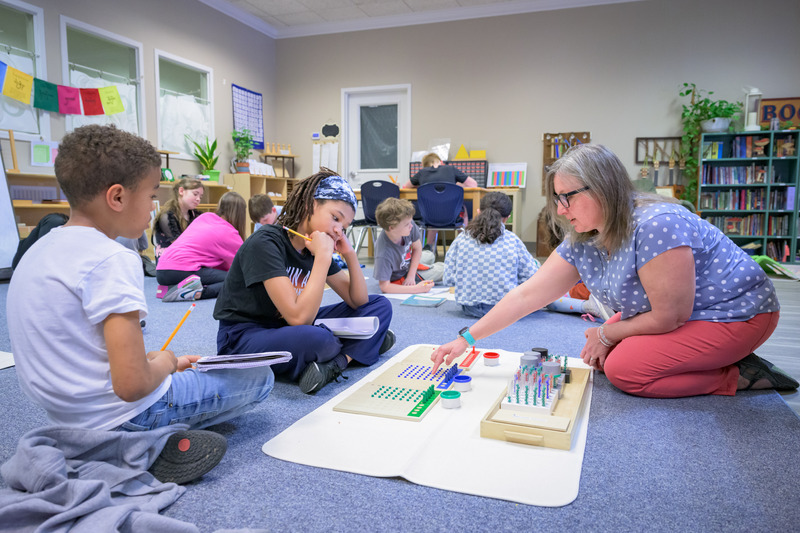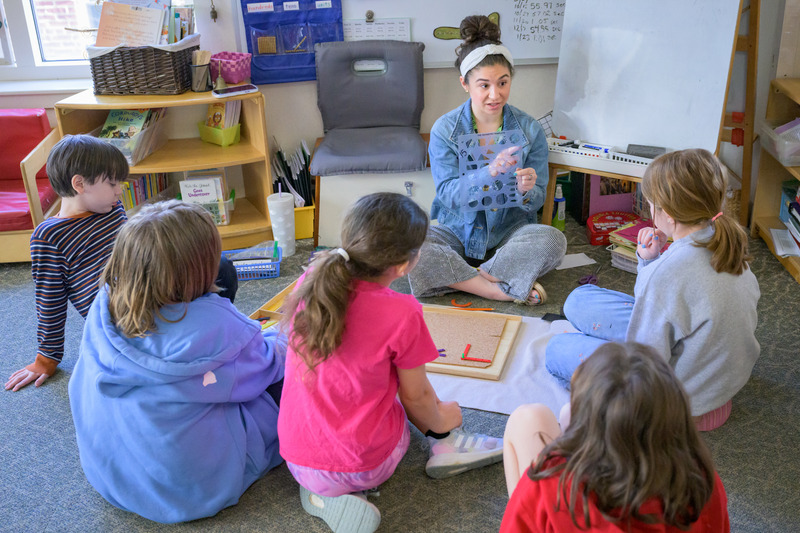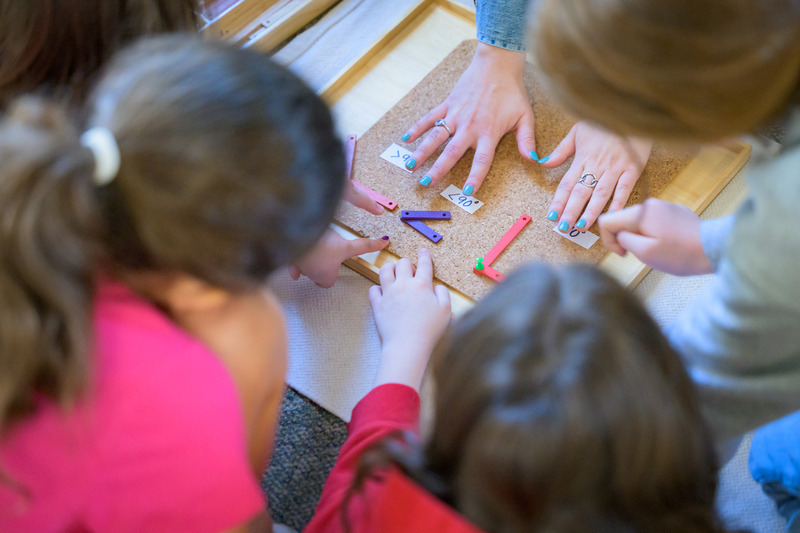
UD PCS teacher training program
is evolving into a force for change
For many years now, the people working to nudge Montessori education into the mainstream believed they had a lot of good answers for strengthening Delaware’s public schools. But they also faced more than a few good questions:
How will teachers get the intensive training needed to master the technique? Who will support those teachers once they are trained? And what can be done to give more parents access to a movement that has historically been the domain of elite private schools?
At the University of Delaware, those existential educational questions are now leading to some practical answers, thanks to a still-growing program that seeks to bring the “Montessori method” within everyone’s reach, both in Delaware and around the country.
In just four years, the UD Montessori Teacher Residency program within the Division of Professional and Continuing Studies (UD PCS) has expanded its mission far beyond the original two-year certification residency that has produced 15 teachers for schools in and beyond Delaware. Early in its existence, the program was instrumental in the 2020 launch of the Sussex Montessori Academy, a school in southern Delaware that has a keen focus on low-income children and is now staffed by many UD-trained teachers.
Today, UD’s program—known as UDMTR—is ready to reach higher and further, building on the momentum of recent accomplishments.
Last year, the program was awarded crucial accreditation for elementary education (ages 6-12) from the Montessori Accreditation Council for Teacher Education. It is also expected to earn credentials for early childhood education (ages 3-6) in spring 2025. At the same time, the program’s organizers began pushing ahead with an effort to provide professional development support for Montessori schools in Philadelphia, Baltimore and as far away as Wisconsin and Oregon.

“Our focus is to provide Montessori schools the support that they need to be successful,” said Linda Zankowsky, a veteran Montessori educator who directs the UDMTR program. “One of those pieces is highly trained Montessori teachers, and another piece is continuing professional support for their teachers and school leaders to be able to maintain that quality in the public sector. With the help of the National Center for Montessori in the Public Sector, that support has ramped up over the last year.”
Ultimately, the aim is to transform UDMTR into a new “Montessori Academy” at UD that offers a more holistic and community-oriented array of services, while also advocating for the student-focused teaching technique to be offered in other Delaware charter schools and school districts — an effort spearheaded by an affiliated volunteer nonprofit called Montessori Works.
“The goal of Montessori Works over the next year is to increase the communication campaign, to survey across the state the desire of families to have Montessori education in their communities, and to leverage that work so that we are able to help school districts and others in the communities to see the possibilities for future accessible Montessori schools,” Zankowsky said.
The time is right for such a focused outreach campaign, supporters say. Currently, out of roughly 150,000 public school students in Delaware, fewer than 1,500 are in Montessori programs. These include two public charter schools: First State Montessori Academy in Wilmington (grades K-8) and Sussex Montessori (K-6).
Proponents say parents are increasingly attuned to Montessori’s potential for molding self-regulated, high-performing and happier students. At the same time, more veteran teachers are realizing that “standard” educational models aren’t allowing them to achieve their own professional aspirations, Zankowsky said.
“Many teachers coming to our public Montessori schools have taught in traditional schools,” Zankowsky said. “They’re coming to us because they really don’t feel like they’re teaching in a way that is child-centered, in the way that they always thought teaching would be.”
First State Montessori, the Wilmington charter that was launched about a decade ago, is happy to enjoy the benefits of those newly inspired teachers, especially as more parents clamor to enroll their children. First State started in 2014 with 278 students and one school building, and has since grown to 650 students in two downtown buildings.
“There’s a lot of momentum around it now,” said Courtney Fox, head of school at First State. “We’re realizing kids need more than a traditional classroom was providing. Kids are so much more complex today. And schools are expected to be so much more for kids.”

Before the arrival of UD’s program, the rigorous certification training needed by would-be Montessori teachers in this region was many miles away and practically out of reach.
“It’s basically like going to graduate school again,” Melissa Sugzdinis, UDMTR’s program manager, said of some certification programs. “Montessori teacher training is expensive in general, but it’s so much more accessible now because of UDMTR.”
The two-year residency allows its students—many of them already seasoned “traditional” teachers—to assimilate Montessori techniques in a real-world setting and become proficient in the methodical planning and practice required to create an inspiring Montessori lesson.
“Wonder and awe are huge parts of our curriculum,” Sugzdinis said. “And wonder and awe often lead to action.”
Already, UDMTR serves as a primary source for new Montessori teachers in Delaware, and the follow-up training that UD creates for schools is proving crucial inside and outside of Delaware’s borders.
In the Riverside and Northeast neighborhoods of Wilmington, UDMTR is providing the teacher training needed to launch Kingswood Community Center’s own Montessori offerings. And when Baltimore Montessori Public School reached out for assistance, UD responded with an array of professional development tools, including teacher orientation, monthly professional development sessions, leadership guidance and one-on-one support for teachers embarking on their Montessori careers.
“I don’t know of another training program that is specifically tailored to the needs of the public sector,” said Monica Donnelly, managing director of the Baltimore school. “Most of the people offering training have a set package. They have their own goals and structures and ideas. But with UDMTR we were able to say, ‘Here’s our situation, what can we put together?’ It doesn’t feel like it’s out of a box. It feels very personal to us.”
The Baltimore school opened in 2008 with 168 students. Over the next 16 years, that number rose to 585, and parent interest shows no signs of waning.
“There’s certainly demand for it,” Donnelly added. “Families want peaceful, safe environments where students will be lifted up instead of a heavy-handed, top-down approach. They sense students no longer learn best sitting at desks. Lower-income families deserve quality education, and Montessori is seen as part of the answer.
“We know it works and we know families want it,” Donnelly said.
That demand arises from Montessori’s nurturing, egalitarian approach to students: There are no desks, no teacher-led lectures, no single-grade classrooms. Instead, students of different ages are encouraged to work from individual floor mats, or at workstations around the classroom, while a team of two teachers attends to their needs.
Proponents stress that it’s just as much about fulfilling students’ human potential as their academic potential.
“It’s a learning method that respects children as whole people and doesn’t try to fit them into boxes,” Donnelly said. “It lets them find who they are, and they become more responsible, engaged, excited. It’s preparing children for the future we don’t yet know exists.”
“For some children, this may be the first time they are really heard,” said Ellen Kropiewnicki, a Montessori instructional coach at UD.
“And seen,” Sugzdinis added.
Throughout the school year, teachers continuously refine lesson plans with the help of coaches like Kropiewnicki. Inevitably, they come to realize that they are there to prepare students not just for tests, but for life itself, Montessori educators say.
That’s especially important when the students are born into situations that sometimes make it hard to find the right path forward. That was partly what inspired UDMTR graduate Mason Falligant, who was a Montessori student himself through sixth grade, and now serves as upper elementary team leader at Sussex Montessori.
For Falligant, UDMTR made it possible to pursue two of his dreams: finding a teaching job where he could bring Montessori’s benefits to a new generation, while also pushing back against the educational inequities he saw as a high school student in Alabama.
“I always knew I wanted to make my way back into the Montessori classroom, but in a public school setting,” he said. “It’s fairly rare that there’s access to a Montessori school in the public sector, especially in an area that’s not affluent.”
At Sussex Montessori, about half of the students come from low-income households, and 45% identify as people of color. “It’s amazing to see how the parents are responding,” Falligant said. “It’s really exciting to see the understanding of what Montessori means grow so fast. A lot of our families had no idea what Montessori was, and now more people are seeking it out specifically.”
Fox — who was Delaware’s Teacher of the Year in 2008 — agrees.
“Being a public option has definitely changed the perceptions of Montessori in Delaware,” Fox said. “And having it now in Sussex County helps show that it is something for all kids, no matter who they are or where they live.”

